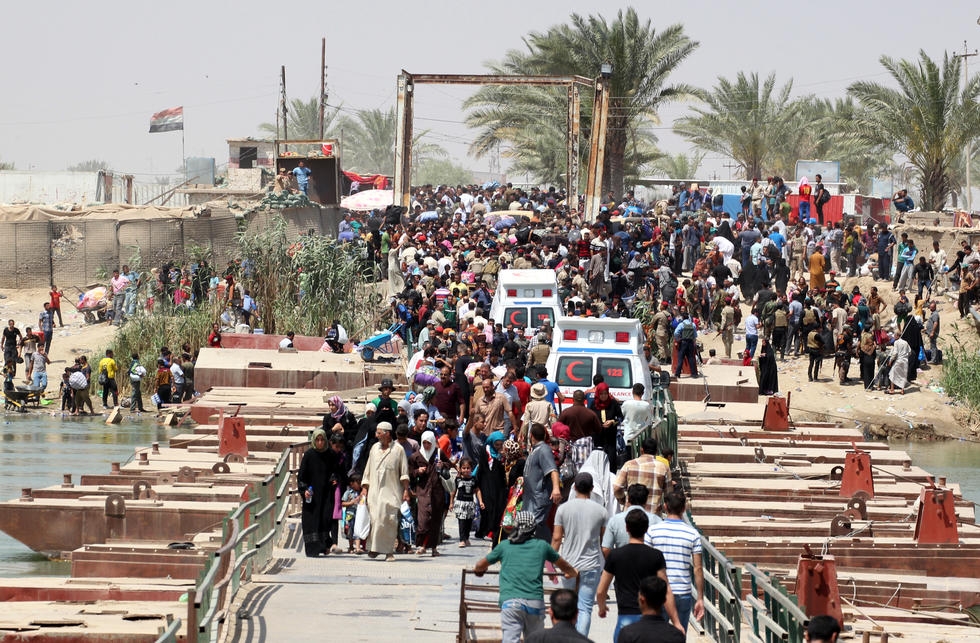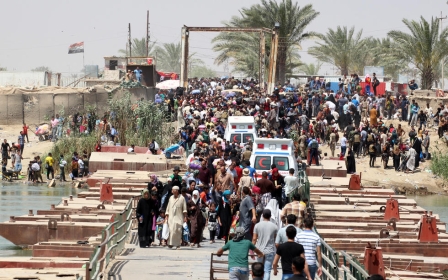From hearts and minds to barrel bombs, Ramadi symbolises failure of Abadi’s Iraq

The fall of Mosul brought former Prime Minister Nouri Maliki’s sectarian politics into question. Many observers, and most importantly the US government, called for a leadership change, which was meant to address some sectarian political mistakes that had been made since Maliki’s disputed electoral victory of 2010.
With Prime Minister Haidar Abadi’s election, the Iraqi government was supposed to turn over a new leaf, and to be more inclusive of Iraqi Sunni voices. This was to ensure that Sunni hearts and minds would not be so easily won over by the Islamic State in the future.
Almost a year later, the fall of Ramadi looks like a déja vu. Why is the capital of the Anbar Governorate in the hands of the Islamic State? Has Abadi’s leadership changed anything for Iraqi Sunni population?
From the perspective of Fallujah, the birthplace of the anti-Maliki demonstrations in December 2012, not much has evolved. It has been under total control of the Islamic State since early 2014, and residents tell me that it has been receiving a steady stream of governmental barrel bombs ever since.
Barrel bombs, the same that Syrian leader Bashar al-Assad uses on his defenseless population, are illegal under international humanitarian law: their continuous use by the Iraqi government is a war crime. In addition, the Fallujah residents who are even too poor to live under a tent in other parts of the country are now also receiving Katyusha rockets from nearby Shi’a militias positions.
If Prime Minister Abadi seems to be more diplomatic than his predecessor, favouring his US or Iranian allies according to where the wind takes him, facts on the ground for the average Anbar heart and mind have not changed.
So why has Ramadi fallen? First, commentators are quick to observe that the it is not so much due to the might of the Islamic State than to the inefficiency of the US-trained Iraqi security forces and the local Sunni tribes.
Maliki's broken army
The current state of the Iraqi army is a legacy of former Prime Minister Maliki’s sectarian politics, which favoured the expansion of the groups now known as the Shi’a militias over the strengthening of a religiously diverse Iraqi army.
Before the fall of Mosul last year, the Iraqi army was suffering from many ailments: a lack of the latest weapon technologies, a failure of its military intelligence services to obtain any actionable information due to sectarian divisions in the country, lack of troop motivation and corruption at all levels, a nonexistent training of its special forces since the US withdrawal, and a rampant desertion rate.
Since Prime Minister Abadi inherited a moribund Iraqi army, it is a surprise that Ramadi had not fallen earlier. Last month’s Tikrit operation is not an exception.
Tikrit was never “re-taken” as was triumphantly announced, but strategically abandoned by the Islamic State, which kept as little as 80 fighters inside the city when it chose to focus on other theatres of operation, playing a cat and mouse game that has been its hallmark since the beginning of its military operations.
One should not forget that the fall of Mosul was precipitated by the decoy attack on the Shi’a town of Samarra a week before. Since the sectarian Iraqi army was focused on keeping its Shi’a shrine safe, the town of Mosul became easier to capture once the time had come.
While the Iraqi army possesses the tactical abilities to wage a war against ISIS, it currently lacks the strategy to transform any military gain into a decisive victory.
Winning over Iraqi tribes
So what will it take for Prime Minister Abadi to finally come to par with the Islamic State, strategically? An inclusion of Sunni tribes is definitely a good start.
It was only a couple of weeks ago that some former US-led Iraqi “awakening” tribes joined the ranks of Shi’a militias in the town of Ameriyat-al-Fallujah. Yet those tribes are armed with light weapons, while their Shi’a counterparts have the latest technology. This could cause problems in battle.
In Tikrit, the Sunni Jibouri tribe took a Shi’a-inspired name of Asaeb Ahl al-Haq before it partnered with Shi’a militias to launch the Tikrit offensive. The Shi’a militia human rights abuses after the offensive, combined with the perceived intimidation of the rest of the Jibouri tribe in and around the town of Dhulluyia, may not lead other Sunni tribes to join in.
The establishment of the Hashd al-Shaabi, the popular mobilisation units, is no more than a re-naming of the former Iraqi awakening. All the tribes who would have joined the government have done so already. The others might be reluctant to help the Iraqi regime if means helping it retain its political domination over the Sunni population. Unless Baghdad promises political autonomy for Sunni regions in return for their support against ISIS, the situation will not change. A political solution remains the strongest strategy against ISIS in Iraq.
Prime Minister Abadi ought to take some concrete steps towards ending sectarianism in his country. Politically, this means granting autonomy to Sunni areas. Militarily, it is about stopping its illegal military offensive against civilian populated areas. These are two of the possible long-term strategies against the Islamic State.
- Dr Victoria Fontan is Interim Chair of the Politics and Public Policy Department, American University Duhok Kurdistan; she is also a Doctoral Candidate in War Studies at King’s College London.
The views expressed in this article belong to the author and do not necessarily reflect the editorial policy of Middle East Eye.
Photo: Iraqi residents from the city of Ramadi, who fled their homes as Islamic State (IS) group militants tightened their siege on the last government positions in the capital of Anbar province, wait to cross Bzeibez bridge, on the southwestern frontier of Baghdad, on May 20, 2015. (AFP)
New MEE newsletter: Jerusalem Dispatch
Sign up to get the latest insights and analysis on Israel-Palestine, alongside Turkey Unpacked and other MEE newsletters
Middle East Eye delivers independent and unrivalled coverage and analysis of the Middle East, North Africa and beyond. To learn more about republishing this content and the associated fees, please fill out this form. More about MEE can be found here.





